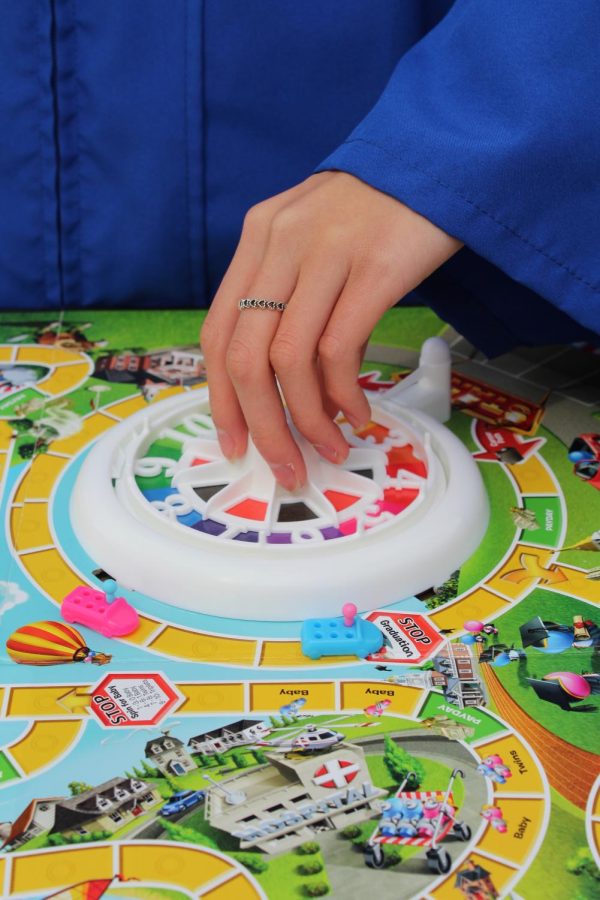Photo by Gurneer Sidhu
Seniors discuss the next major step of their life: choosing life-long careers.
Moving their pieces forward
Seniors share post-graduation plans
May 19, 2023
Working on her next frame 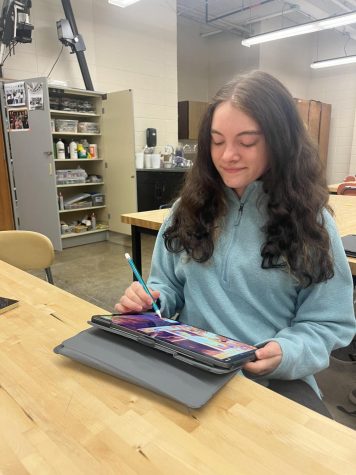
It’s often said that if you choose a job you love you’ll never work a day in your life, and for Jaxson Martin, animation major, this is exactly the case.
To Martin, the field of art is somewhat of a family business. After being inspired by watching her oldest sister “draw a lot when [they] were younger,” Martin “took off from there,” and developed her own fascination with art.
Martin first started to “seriously make art” of her own in sixth grade, something that progressed throughout middle school up to eighth grade when she began learning to navigate the business side of the art world through “doing commissions and selling [her] artwork to people online.”
This ability to capitalize off of what she was passionate about sparked the notion that art was something Martin could sustainably do as a job. In the midst of networking, marketing her art, and communicating with customers, art became “the first career [she] was really interested in.”
“I knew I wanted to do something in the arts, because it’s something that I could do for hours and never really feel like it’s a chore,” Martin said. “I started taking [animating] seriously during the pandemic because I had a lot more free time, and it really helped me realize, ‘I can do this for longer periods of time’ as if it was like a nine to five job.”
While Martin always had a desire to go into the arts she initially “didn’t [know] what exactly,” she wanted to do. Animation eventually appealed to Martin through its direct applicability of her patience when it comes to art, alongside her willingness to spend a lot of time on a project.
“Originally I was actually going to go into illustration, but over the summer I made a minute and a half long animation and I realized that it’s something that I really love and enjoy,” Martin said. “Specifically with 2D animation, the fluidity and how smooth the animation can be– and the fact that somebody had to do most of that frame by frame, is really incredible to me. More than anything, I’d enjoy learning how to properly animate and the pipeline behind that.”
Though Martin has a “few goals in mind that are more reachable than others,” her dream job would be to lead an animated show. Regardless, Martin feels she would be “happy to have any part of media that [she] really enjoys,” whether that is through storyboarding for a well-known film, or through doing 2D animation for larger companies such as Netflix or Cartoon Network.
In looking towards the future of an artistic career, Martin hopes that the importance of what she and other artists create will become further recognized and acknowledged going forwards.
“Our society should pay more attention and appreciate the work of artists, as a career we’re really overlooked,” Martin said. “People think it’s easier than it actually is, when really if you look at anything around you, it’s probably made by an artist; society can’t really function without us.”
Making new prints 
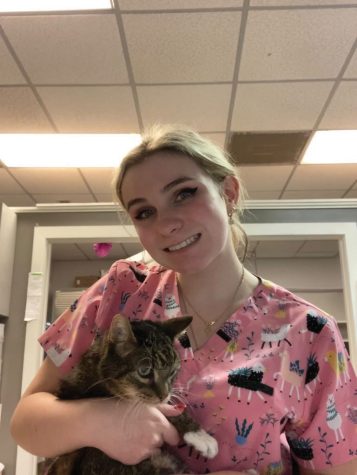
Although her interest is working with cats, dogs, and horses, Tina Schroedel believes that becoming a veterinarian is not just about helping animals, but people as well.
“A couple of months ago, we had to put one of our cats down, which was sad and we went to my [workplace]. As awful as the experience was, [the animal hospital] made it the best it could be for us, and as painless as possible, because they gave us a lot of emotional support, which is something that really inspired me because I want to be able to do that for people,” Schroedel said. “Giving care is not only helping out the animals by trying to make them get better, or bring them to a better place but also to help out with emotional aspects, like when people feel better.”
Schroedel says she has “wanted to be a vet since [she] was little.” She was introduced to the profession as a result of taking her cats to the vet.
“Both [of my cats] need to be taken to the vet; that’s how I learned about the profession. I started looking into [veterinary medicine] because I’ve always been into science. Medicine is something that’s very appealing to me, but I don’t necessarily want to work on people. I think that working on animals is more interesting,” Schroedel said.
To expand her veterinary knowledge and work towards a career of being a general practitioner, Schroedel has been working at Gilmer Road Animal Hospital since June 2022.
“I’m a kennel assistant at the animal hospital. I do a lot of cleanup stuff. I also get to work alongside the technicians. I was able to vaccinate a dog. I got to drop and administer the vaccines myself. I’ve gotten to help out during surgery, like I’ve been able to find the heartbeat of a surgical patient who’s under anesthesia [and] monitoring the breathing and heart rate,” Schroedel said. “I was also able to go to a continuing education seminar that technicians have to go into in order to renew their license, even though I do not have a technician’s license. I was able to get registered under unlicensed technician.”
At one point, Schroedel considered being an actuary; however after seeing “firsthand the environment” at the animal hospital is like, she says she preferred being a veterinarian “as opposed to just sitting in a cubicle doing math all day.”
Schroedel says that there is so much work “in the background that veterinary technicians do [that] a lot of people don’t think about.” Even so, that does not stop Schroedel from wanting to help animals and their owners as her future.
“Obviously, I don’t get to just sit around and play with animals all day. That’s not what [being a vet] is,” Schroedel said. “But getting to actually care for them and help them is very rewarding. At the end of the day, I can go home and know that I made a difference, even if it was a small difference like getting a prescription together or just drawing a vaccine. It was small, but it was still something.”
Finding fun in fine-tuning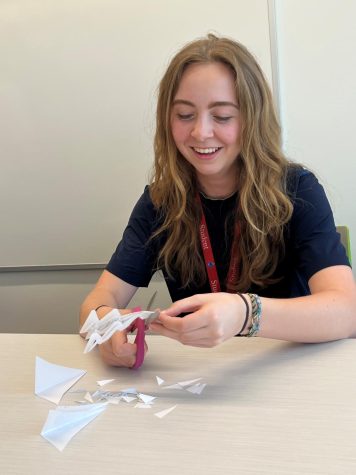
Spraying shaving cream on a table to practice writing was not what Zoë Hilton imagined when she decided to “help people find their happiness in their lives” through occupational therapy.
This fall, Hilton will be attending Carroll University’s Master of Occupational Therapy (MOT) 4+2 Direct Admission Program, a program that guarantees her admission to the university’s Master of Occupational Therapy upon completion of a bachelor’s degree in psychology.
Influenced by her older sister, a physical therapist also from one of Carroll University’s direct admit programs, and subjects such as psychology, sports medicine, and anatomy, Hilton knew physical therapy was close to what she wanted to pursue, but “it wasn’t quite for [her].”
“I was looking at similar careers and I stumbled upon occupational therapy, which takes a more holistic approach than physical therapy does, so more like fine motor, and [it’s] focused on what patients personally need for their occupation, and just like living their lives, whereas physical therapy is more about big motor movements. I thought that was super cool,” Hilton said.
In occupational therapy, therapists often work on movements that are used daily, such as getting dressed, writing, and playing catch. Among occupational therapy, there are many specialties. Hilton hopes to specialize in pediatric occupational therapy, especially after her shadowing experience.
“I did some shadowing recently with pediatric occupational therapy, and that was super fun. I really liked the kids and getting to see everything that the therapist did. So that definitely helped solidify [my career path],” Hilton said. “The place [where I shadowed], the inside looks like a giant playground. The kids were always so happy to be there and a lot of it didn’t really feel like therapy. It just felt like having fun.”
For those who are considering careers in healthcare, Hilton advises that before choosing a career make sure to consider the workplace environment, which has been a big factor for her.
“I [initially] wanted to be a pharmacist, but a lot of what made me choose occupational therapy was just being able to help people creatively, developing relationships with patients and also just like being able to like be up on your feet and moving as opposed to other [jobs],” Hilton said. “[You] have to be patient and creative [to be an occupational therapist]. A lot of the kids have difficulties with transitions and regulation issues. You have to be very patient and expect that they won’t be able to do everything and that they won’t want to do everything. Just try your best to work with the [patients] and help their lives.”
“Out of the frying pan,” up for hire 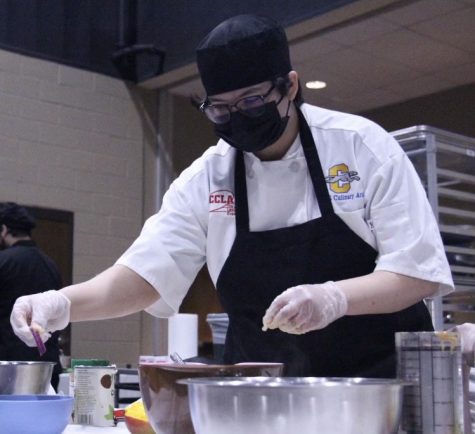
Wanting to introduce people to new flavors with his creativeness, this senior is cooking up goals to become a private chef.
Cole Polk “grew up in the kitchen” by helping his grandmother, a baker, and his mother and father, who also enjoy cooking. He says that these experiences pushed him to consider culinary arts as a future career, which eventually led him to perceive cooking as a form of art.
“You take these ingredients, you cook them, and you make them into something new. Then you repeat that,” Polk said. “It’s just a lot of time, effort, and skill that goes into it. It is the same as how a painter takes years to gain those skills.”
Polk has found creative outlets and social media platforms such as Instagram that lets him share his culinary creations with a wider audience.
“After I made carne asada fries and I was like, ‘dang these look so good. I have to post something right now,’” Polk said. “I continued to keep up with it and track my progress. I really just wanted to share my skills with other people and see other people find joy in something that I made.”
With making food blogs, taking culinary arts classes throughout high school, winning cooking competitions, and working at local pizzerias, Polk has already created quite the resume for himself.
Yet, he fully plans on attaining more education post-high school, his top choice being Johnson and Wales University in North Carolina because of their business and culinary programs.
“I want to cook for famous people; that would be amazing,” Polk said. “If you’re a traveling chef, your clients pay you to travel to them. Traveling is something I enjoy with being a private chef.”
Blazing a new trail 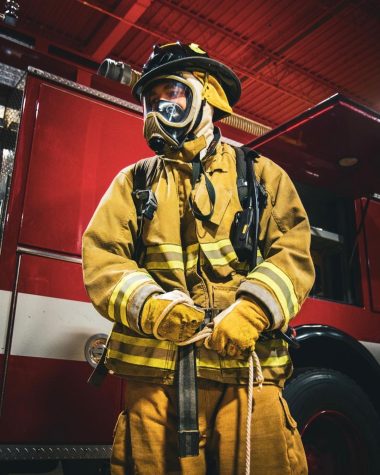
“What led me to become a firefighter? Last year, on my way to school, I saw this big accident on the road. […] You know where the Walgreen’s and Chase Bank is? I was waiting to turn left. […] I see this car inching out towards the middle of the road. The light was red. Out of nowhere, while this lady was in the middle of the road, a giant truck [came] and [swept] her out. It felt like everything stopped,” Ricky Chavez said.
In that moment, Chavez says he felt scared and useless: feelings he did not want to experience again. Upon doing research, Chavez learned the woman in the crash did not make it. Afterwards, he knew his career should be spent helping people. When he came back home that day, he told his mom he had decided to become a firefighter.
Since this realization, Chavez has been endeavoring during his senior year to prepare himself for the demands of firefighting. Alongside a cadet program in Waukegan, he will be obtaining certification with Lake County Tech Campus’s firefighting classes. There, among many other things, he does search-and-rescue drills, forcible entry drills, and goes to abandoned hospitals. Despite all of this, it’s the people at Tech Campus that stick out most to Chavez.
“The people I’ve met there are like a second family. My mentor [is] definitely a big role model in the world of firefighting.” Chavez said. “I look up to him because that’s the type of firefighter that I want to be: the one that knows how to get things done, knows what they’re doing, [and] the one who other firefighters look up to.”
With these aspirations, Chavez says he wants to work his way up to the big city, where he will have more opportunities to help people survive. It’s his “just go do it” mentality that will let him become the firefighter he aspires to be.
“If there’s someone in a building, I’ll go for him. I’ll try and find [him]. I don’t think I would leave without them. If I wasn’t bringing someone out, then I’d see that as a failure,” Chavez said.
It’s for these reasons his family fears that he will “go on a call one day and not come back,” but even that cannot stop Chavez in pursuing the call to action for his future career.
“I wouldn’t want to ever leave [my family] like that, but at the same time, this is what I want to do. I don’t want to let how my family feels affect what I want to do because for a long time, I didn’t know what I wanted [to do],” Chavez said. “This is the first time I have had a feeling that this is definitely what I want to do.”
Finding out what ‘matters’ 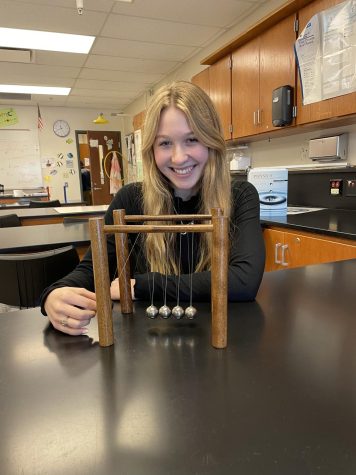
Starting with an “inclination towards STEM,” Isabella Deutsch quickly became passionate about physics — more specifically astrophysics — through hands-on experiences and research.
Knowing that she wanted to explore science after taking many “personality tests” and having an interest in space, Deutsch decided to take AP Physics 1 during her sophomore year. However, it was not until her junior year, while taking AP Physics C, that “everything exploded” and her passion for physics was ignited.
“I just really enjoyed working through labs and kind of dealing with preconceived notions of like, ‘oh, this is what I think should happen’ and the exact opposite happens,” Deutsch said. “So, I really got into physics and then decided that I didn’t want to teach but I wanted to go into research and be able to mess with things and play around with things for my life and for a job.”
However, studying physics comes with its difficulties, especially from other people’s “misconceptions” that Deutsch often came across. The most common one Deutsch hears is that “physics is really hard and you have to be super smart.”
“I don’t think that’s necessarily true. When I was younger, I wasn’t in advanced math. I got kicked out. I got put back in; I had a process of going back and forth. Yes, that evolved over time. I would not say in any way that I was born a child prodigy. I think people’s understanding of physics really comes from their experience,” Deutsch said.
Deutsch also notes there is still an imbalance between the genders of those who study physics.
“I think there’s definitely a type [of person] perpetuated in society of ‘this is what people who go into physics [look like],’” Deutsch said. “That’s discouraging because there are plenty of instances I’ve been in where I’ve been the only female in the room, the only female in my research group.”
Overcoming some of the barriers of studying physics, Deutsch plans on attending the University of California, Berkeley for her undergraduate degree in physics to achieve her future goals of completing a Ph.D. in astrophysics. When she applied to schools, she knew that she wanted her “undergrad to have research opportunities,” especially after doing research at Northwestern University the summer before her senior year.
“I was there for six weeks,” Deutsch said. “They taught me a lot more [about the] astrophysics side of coding and I worked on telescopes. It was a really broadening experience.”
After the hands-on experiences that she has had and gaining a passion for physics, Deutsch hopes that girls like her who pursue careers in STEM continue to do what they love.
“My advice to anyone, especially girls who are pursuing STEM is don’t give up and don’t take anyone else’s opinion into a fact. It’s only about what you want and what you think challenges or motivates you. It doesn’t really matter what anybody else thinks about it because it’s not their life. It’s yours. And things will be difficult,” Deutsch said. “I’m hoping you know that the difficulties within that field and gender bias tend to diminish over the years, but you just have to kind of push through and kind of deal with everything at times because if it’s what you want, you’re doing it.”
Breaking into the market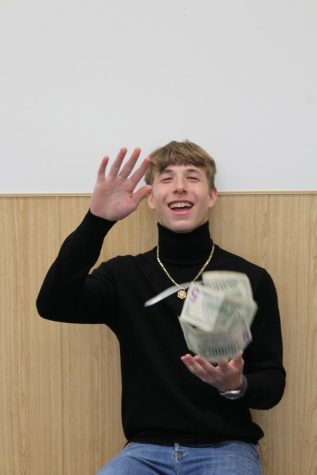
Danny Weinstein originally aspired to be a doctor, but after realizing he had an aversion to having to deal with blood, he knew it was a “no go” for him. Influenced by observing his dad, Weinstein quickly grew an interest in the practice of business and money at a young age.
“From an early age, I’ve always been intrigued with money. [I wondered about] how everyone loves money, the flow of money, how businesses operate, how our markets work, and how different functions or how different parts of our society function economically,” Weinstein said.
Business has “a lot of different paths” that require people to experiment with all of them, according to Weinstein. As a result, Weinstein took an investment management course his freshman year. He enjoyed the class so much that it acted as a catalyst for Weinstein to take more action in pursuing a business career.
“After [investment management], I started researching different markets, investment strategies, and ways to manage a portfolio. I [was] investing in the stock market, doing some day trading on the side, paper trading, not with real money [at first], [but later] with some real money, and learning from my mistakes,” Weinstein said. “I found I’m interested in learning more about how day trading works, and developing those skills in college.”
Combining his business interests with his intrigue for travel, Weinstein decided to major in International business, so that he could succeed in any market, “whether it be the London Stock Exchange or the Tokyo Stock Exchange.”
By accepting admission at Northeastern University, he already has opportunities to study abroad. For now though, Weinstein has found opportunities at home by working at a dental clinic to strengthen his business skills.
“[Since] sophomore year, I’ve been interning at a dental clinic, but I’m not doing any dental stuff there,” Weinstein said. “I’m working [in] insurance there. I’m learning about insurance and the business aspect of a company, such as a dental clinic, and how that functions.”
Beyond having the skills for business, Weinstein also believes his character will allow him to succeed in “a high intensity job.” Simultaneously, he believes that the opposite holds true too; a career in business will allow his character to thrive.
“I want to go into a high intensity job. I’m someone that’s dedicated and someone that’s willing to work as long and as hard as necessary to accomplish my goals,” Weinstein said. “Obviously, that perseverance is there. In business there is the stereotype that people in business lack empathy at times, because they’re just always thinking about money rather than the social aspect of interaction, [but] I think that empathy is gonna help me a lot to grow as a business person.”
Striking the next note 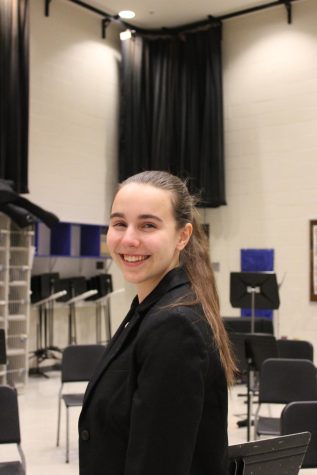
It all started out as a classic sibling cliche: following in her older siblings’ footsteps and enrolling in music classes because they did. Although now her siblings mostly have music as a hobby, Natalie Czarnik intends to continue her involvement in music and make it into a profession.
“I like that you can create something out of nothing. It’s not like there’s one specific answer […] or way to perform the music. There’s different types of music you can perform. There might be things written in a piece that you can do, but there’s more beyond that, that you can do to create art [with] more of an intention,” Czarnik said.
Being a high school choir director, however, was not the first thing Czarnik imagined herself doing. Czarnik explored a few other career paths, including interior design and nursing, but always “came back to music education.” However, she says one instance last year sparked the idea that music education was what she wanted to pursue.
“We had a day in choir the week of our concert, so we really needed to rehearse, but we were having a sub. And they [needed] some volunteers to help go through a piece during class and I was like, ‘okay, I’ll help out.’ I ended up enjoying it a lot more than I thought I would,” Czarnik said.
Though Czarnik does both choir and band in high school, she chose choir for several reasons. Czarnik also says that singing has “always been a part of [her life],” all the way back to when her mom sang songs to her as a child. On the other hand, Czarnik did not start band until fifth grade.
“Choir is something that makes more sense to me,” Czarnik said. “Maybe that’s because everyone has the same instrument in a way [whereas] they talk about ‘oh, in your part here’ when they’re talking to different instruments in band, [but] I only see my part and I don’t really know how the other instruments work [together]. Choir and singing has always seemed to be more of my strong suit, so I’ve enjoyed it more.”
Czarnik is a section leader in both band and choir, where she says she gets to teach others in her section, but is not quite the same as “teaching an entire class.” Despite her limited hands-on experience in music education, Czarnik notes that since she determined her major, her music teachers have been more inspiring to her.
Czarnik says people have voiced their concerns to her about a career in music, especially because they believe “music is being written out of a lot of schools.” Though she sees some truth to the statement, “it’s not true in other ways.” Czarnik says that there is value in music because of how it impacts listeners by allowing them to feel more, become better people, and understand art deeper.
“There’s a lot of people that don’t necessarily understand the importance of music, and some maybe never will,” Czarnik said. “[However] most, once they experience something that’s really powerful and moving with music, there’s almost no question otherwise. Why wouldn’t we teach this? Why wouldn’t we have this in our lives?”
Writing new lines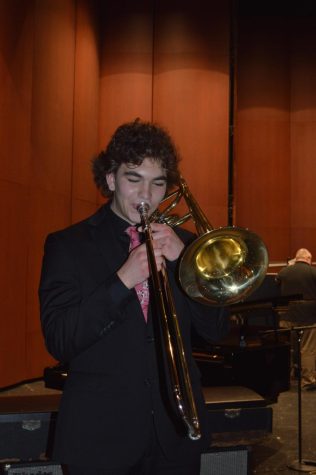
Nathaniel Stall’s musical journey originated when he began writing and arranging small songs in fifth-sixth grade. He recalls the instruments “came pretty naturally” to him, leading him to take an interest in music right away.
Going forward, Stall integrated music into his curriculum and personal life via in-school and private lessons, but where he really found a passion for the field was through the liberty he found in the performance of jazz music.
““I’ve been doing jazz band as long as I could,” Stall said. “I prefer making things up on the spot; it uses my creativity more than a classical setting would. With jazz you’re always learning about new lines to play, new vocabulary essentially, and I enjoy trying to play each more difficult thing and consecutively build on top of it.”
The urge to deviate from what is written on a page is something Stall says is a “natural desire,” as he is someone “who is always trying to think up something in [his] head or write something new.”
Likewise, jazz performance embodies facilities Stall feels are less accessible through other music majors like education, composition, or theory. While other majors include parts of composing or music theory, Stall appreciates its performance’s greater focus on personal improvement.
“When you play something another [musician] recognizes they might smile or laugh at it or cheer and that’s really rewarding,” Stall said. “It’s fun when one musician can tell what you’re going to do, and they do something to respond so you’re kind of having a conversation.”
The rewarding nature of constant adaptation in jazz is partially what Stall decided to chase in higher education; but though he had always had the passion, his final decision to go into music as a career was not something that went unchallenged.
“It can be challenging for people to justify that they’re making the right choice when it might make it hard for them to financially survive,” Stall said. “But I think it’s generally worthwhile to pursue something you really like over something you think will get you success or a lot of money. People who are in music do it because they love music, not because they want to make six figures.”
Luckily for Stall, he is not limited to one choice as attending Northwestern University will allow him to dually verge into the lucrative field of Computer Science. While acknowledging the professional benefits of majoring in Computer Science, Stall also finds the “fluency” and constant expansion of the field will allow him to “make personal applications that benefit [his] life.”
“I really like computer science, because it’s completely logic based. I sort of look at [jazz and computer science] from the viewpoint that it’s kind of like solving a puzzle,” Stall said. “One is like a logical puzzle, ‘how can I break something down and solve it in a number of steps?’ And the other one is, ‘how can I solve what’s in my head to put it through the trombone?’”
This manifestation of problem solving skills in both fields and the “general knowledge that [he] will gain” are both tools Stall thinks will become useful regardless of what he goes into.
“Right now they both sort of build upon thinking skills essentially, like how to rationally solve something or how to think through something or how to be creative about a solution,” Stall said. “People and institutions are always looking for new ways to combine very different fields. I think down the line, I’ll find that there are ways that the two careers can combine or be used together.”
